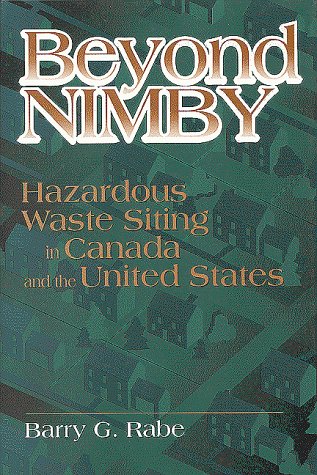The virtual inability to open new hazardous waste management facilities in Canada and the United States stems directly from a form of community opposition so common and vehement that it is commonly identified as a syndrome: Not In My Back Yard (or NIMBY). Whether such facilities are proposed by governmental agencies or by private waste management firms, communities are usually shocked to learn that they have been selected to host these facilities and take collective action to thwart them. Such actions have blocked many poorly planned facilities and stimulated greater interest in preventive, waste reduction strategies. They have also, however, thwarted the adoption of new waste management technologies and created serious geographic inequities in the distribution of waste management responsibility across the two nations. "Beyond NIMBY" shows that certain siting strategies in Canadian provinces and American states have created successful siting agreements, broad public support, and comprehensive systems of waste management and prevention.
These include continuous public involvement in waste policy deliberations, a commitment to pursue siting only among communities that volunteer after extended democratic dialogue, and extensive packages of economic compensation and assurances of safe, long-term facility management. Also important are guarantees that any new facility be part of a broader waste strategy for a particular province, state, or region and will not be allowed to become a magnet for wastes from areas that have not taken serious steps to address their own waste problems. The book concludes with the suggestion that these strategies can be applied to other NIMBY blocked proposals, such as siting for prisons, drug and alcohol treatment centers, and nursing homes.
- ISBN10 0815773080
- ISBN13 9780815773085
- Publish Date 1 November 1994
- Publish Status Out of Print
- Out of Print 21 September 2012
- Publish Country US
- Imprint Brookings Institution
- Format Hardcover
- Pages 225
- Language English
